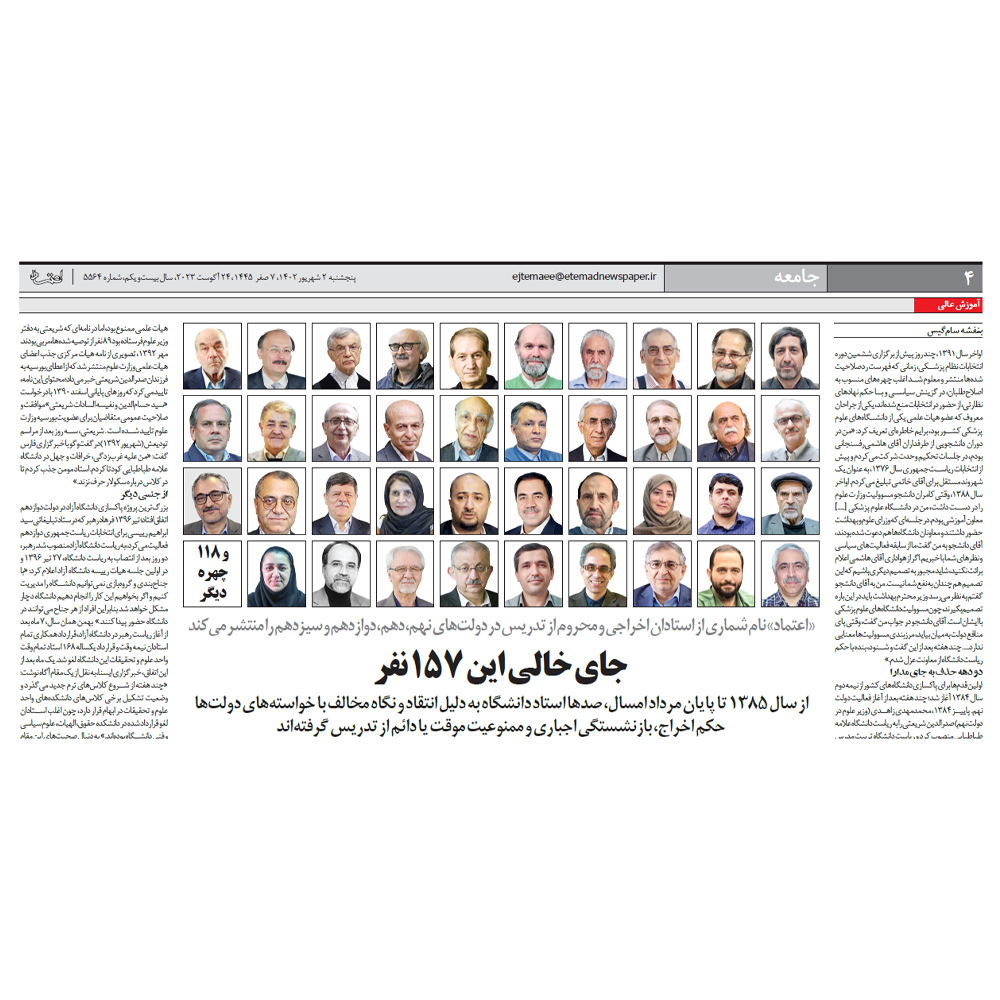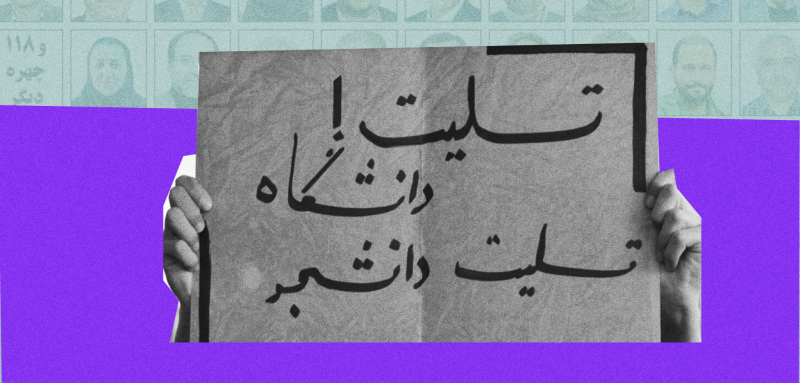Over the past year, the Iranian university administration has terminated the employment of 58 professors. In just the past week, an additional 52 professors were dismissed. These academics are facing dismissal, suspension, or forced retirement, citing various reasons, and the list may continue to grow both in name and number. It appears that President Ibrahim Raisi's government is currently at a crossroads with this approach towards higher education. It could either lead to an elevation in educational standards and scientific advancement in Iran, or it could potentially be the straw that breaks the camel's back, a blow threatening the stability of the entire system.
Despite assurances from Iranian officials and authorities that the isolation or dismissal of these professors is not politically motivated, the actions and statements of the dismissed professors suggest otherwise. The majority of those who have faced termination had either expressed solidarity with or actively participated in the "Women, Life, Freedom" protests that erupted across Iran in the autumn of 2022 following the tragic death of Mahsa Amini, a young woman who was arrested by the morality police in Tehran.
Such purges within the Iranian higher education system are not a novel occurrence. Previous administrations have similarly implemented such measures under various pretexts, including political, security, and academic rationales. However, it is apparent that Ibrahim Raisi's government is pursuing these actions with greater vigor, resulting in a higher number of academic dismissals.
The history of the last three Iranian governments in expelling university professors
Examining the statistics, former President Mahmoud Ahmadinejad's administration terminated the employment of 85 professors over an eight-year span. In contrast, during the two presidential terms of former President Hassan Rouhani, from August 2013 to August 2021, only around 14 professors faced dismissal. However, within the initial two years of Ibrahim Raisi's presidency alone, a staggering 110 university professors have already been affected.
The majority of those who have faced termination had either expressed solidarity with or actively participated in the "Women Life Freedom" protests that erupted in 2022 following the death of a young woman named Mahsa Amini in Tehran
Certainly, it's evident that the ongoing power struggles between Iran's major political factions have provided the backdrop for a troubling trend in Iranian higher education: the dismissal of professors. This pattern involves the suspension or removal of academics whose beliefs clash with the prevailing political ideology of the government in charge. For instance, during Mahmoud Ahmadinejad's conservative presidency, professors with reformist leanings faced expulsion, only to be reinstated when the reformist administration of Hassan Rouhani assumed power. Conversely, the Rouhani government took similar actions against conservative professors, perpetuating this cycle.
However, this recent surge in faculty dismissals is motivated by other factors. Professors are now being ousted if they participated in recent protests or expressed solidarity with students involved in these demonstrations, irrespective of their political affiliations. Notably, some of those affected belong to the conservative faction.
The universities facing the most dismissals
The universities bearing the brunt of these purges include "Azad" (private) universities and government-run establishments like the University of Tehran, Tehran University of Medical Sciences, Alameh Tabataba'i University, Shahid Beheshti University, Iran University of Medical Sciences, Ferdowsi University in Mashhad, and Shahid Bahonar University in Kerman. These universities have received multiple directives to suspend professors, temporarily bar them from teaching, impose entry bans, withhold salaries, and enforce forced retirements among their academic staff.
Statistics reveal that out of the 110 professors dismissed from these universities, the distribution is as follows: 29 from Azad University, 27 from the University of Tehran, 11 from Tehran University of Medical Sciences, 8 from Alameh Tabataba'i University, 7 from Shahid Beheshti University, 5 from Iran University of Medical Sciences, and 3 from both Ferdowsi University in Mashhad and Shahid Bahonar University in Kerman. Other institutions such as Kurdistan, Isfahan, Sharif University of Technology, and Babol University of Medical Sciences saw 2 cases each, while Gilan, Shiraz, Mazandaran, Kermanshah University of Medical Sciences, Jahrom, Hakim Sabzevari, Tabriz University of Medical Sciences, as well as the Persian Gulf University and Al-Zahra University, reported 1 case each.
Official justifications
In response to these developments, several responsible officials have denied any political involvement in these dismissals. Mohammad Khalegh Amiri Hosseini, the head of the Committee for Faculty Employment at the Iranian Ministry of Higher Education, has argued that the primary reason behind these actions is the declining academic quality and standards among these professors. He claims that their dismissal ultimately benefits both students and the universities.
The President of the Free University, Muhammad Mahdi Tehranchi, has emphasized that "all of these separation and suspension actions are due to the retirement of professors and the employment of young professors with a high level of academic expertise. However, the dismissals for political reasons are incorrect and far from the truth."
 Pictures of dismissed university professors in an Iranian newspaper
Pictures of dismissed university professors in an Iranian newspaper
While Iranian President Ibrahim Raisi hinted at his support for this plan to dismiss professors and did not deny a connection between this process and the involvement of dismissed professors in the "Women, Life, Freedom" protests, stating: "The acts of rioting that occurred last year misled some academics and professors, and they needed to be enlightened. Taking inspiration from the general amnesty of the Leader of the Islamic Revolution, we applied this amnesty to academics who made mistakes." This implies that they were not arrested or politically tried but rather prevented from teaching in universities.
The Iranian Ministry of Interior also issued a statement that increased suspicions of political motives behind the removal of university professors in the country, stating: "What the Ministry of Higher Education has done regarding a number of professors who have suffered a decline in their academic level, but who have played an important role in media presentations, is based on legal standards and, of course, the revolutionary mission of the ministry."
The "Kayhan" newspaper, affiliated with the office of Supreme Leader Ali Khamenei, welcomed the dismissal of professors and the decision to replace them with professors "loyal" to the regime. It stated that the dismissal of professors critical of the regime is the "minimum punishment" for them.
Professors and students' reactions
In rejection of these actions, the Union of Iranian University Professors, led by Dr. Mohammad Reza Aref, issued a statement strongly criticizing the extensive interference of security institutions in the internal affairs of universities, the imposition of a specific political approach on their affairs, and the employment of individuals affiliated with a government-supporting political faction in the teaching staff of Iranian universities. They called on "unconcerned" institutions in universities, such as the Ministry of Interior, to fulfill their legal duties, including improving national security, rather than intervening in university affairs.
In this context, students from the Universities of Arts, Shahid Beheshti, and Gilan issued protest statements against the wave of professor dismissals. In these statements, students condemned the dismissal of their competent professors and the appointment of substitute professors, considering this step an insult to the dignity of knowledge, universities, and students.
In the statement from the University of Arts students, it was stated: "We are not attending classes. Substitute professors are an insult to the dignity of classes, knowledge, and universities, and we will not be partners in this insult. Until Dr. 'Aliya' and Dr. 'Maziar' return to the lecture hall, the answer will be (no) to you and your empty classrooms."
Some in Iran fear that recent developments are akin to a "cultural revolution" or a process of "purification" within academic and educational circles following the victory of the revolution in Iran in 1979.
The students at Shahid Beheshti University also vehemently opposed the expulsion of professors in the following statement: "We never imagined a day when we'd become so undesired that our university would cast us out of its protective embrace, or that our esteemed professors across the nation would be ousted simply because our perspectives differ. They've charted a future without us, but little did they know, with every passing second and minute, we're crafting a future without them" (alluding to the current regime).
In a staunch defense of the dismissed professors spanning Iran, the Student Union of Kielan University issued a statement sharply criticizing the erroneous decisions to isolate and sever collaboration with specific faculty members across various universities in the nation. They saw this action as a stark warning against the continued flow of independent and free thought because these professors hold views and principles that do not align with government officials.
What will happen now?
Various scenarios emerge, including the potential recruitment of government-aligned professors and the purging of dissenting voices from universities. These speculations have gained substantial traction following the leak of a recruitment letter for 15,000 faculty positions in universities, which swiftly circulated on Iranian social media. Notably, authorities disavowed the authenticity of this letter. Presently, no official statement has been issued by relevant authorities regarding the hiring or non-hiring of new professors. Nevertheless, authorities emphasize the recruitment of young professors to elevate the nation's academic standards.
In Iran, there exists a palpable concern that recent developments bear a striking resemblance to a "cultural revolution" or a process of "purification" within academic and educational circles. These events harken back to the post-revolutionary period in Iran in 1979 when thousands of teachers and university professors were dismissed due to their loyalty to the Shah's regime or their affiliation with left-leaning ideologies.
As per the insights of Iranian observers and experts, the expulsion of professors from universities will undoubtedly cast a long, looming shadow over the performance of academic institutions and the educational journey of students. This, in turn, will erode the country's academic standards both in the short and long term. An exodus of intellectual elites, encompassing scientists, professors, and students, seems inevitable. Such an exodus would culminate in a forfeiture of Iran's esteemed academic standing on the global stage. Furthermore, it could further stoke the flames of public discontent within the nation.
Raseef22 is a not for profit entity. Our focus is on quality journalism. Every contribution to the NasRaseef membership goes directly towards journalism production. We stand independent, not accepting corporate sponsorships, sponsored content or political funding.
Support our mission to keep Raseef22 available to all readers by clicking here!
Interested in writing with us? Check our pitch process here!



